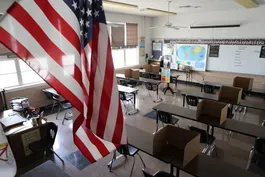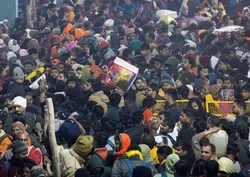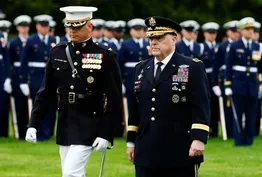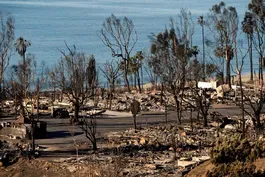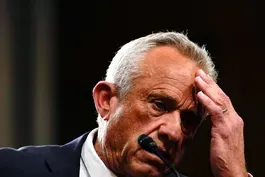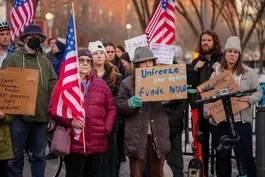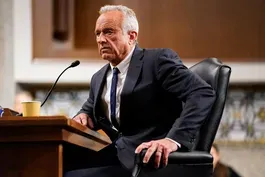
What options remain for immigrants seeking entry into U.S.
Clip: 1/29/2025 | 8m 8sVideo has Closed Captions
What options remain for immigrants seeking entry into the U.S. as policies rapidly change
The Trump administration has shut down or indefinitely halted most legal avenues for migrants to come to the U.S. The revoked pathways include an end or pause to the CBP One app, humanitarian parole, refugee admissions and protected status for Venezuelans. Laura Barrón-López discussed the impact with Jennifer Babaie of Las Americas and Krish O'Mara Vignarajah of Global Refuge.
Major corporate funding for the PBS News Hour is provided by BDO, BNSF, Consumer Cellular, American Cruise Lines, and Raymond James. Funding for the PBS NewsHour Weekend is provided by...

What options remain for immigrants seeking entry into U.S.
Clip: 1/29/2025 | 8m 8sVideo has Closed Captions
The Trump administration has shut down or indefinitely halted most legal avenues for migrants to come to the U.S. The revoked pathways include an end or pause to the CBP One app, humanitarian parole, refugee admissions and protected status for Venezuelans. Laura Barrón-López discussed the impact with Jennifer Babaie of Las Americas and Krish O'Mara Vignarajah of Global Refuge.
How to Watch PBS News Hour
PBS News Hour is available to stream on pbs.org and the free PBS App, available on iPhone, Apple TV, Android TV, Android smartphones, Amazon Fire TV, Amazon Fire Tablet, Roku, Samsung Smart TV, and Vizio.
Providing Support for PBS.org
Learn Moreabout PBS online sponsorshipGEOFF BENNETT: President Donald Trump has signed the first bill of his second term.
It's an immigration action that will change how ICE can arrest migrants.
The Laken Riley Act, named after a nursing student murdered by an undocumented immigrant in 2023, allows for the detention of undocumented immigrants charged with crimes related to theft.
It also allows state attorneys general to sue the federal government if they think their states have suffered due to failures to enforce immigration laws.
The president today also announced an executive order to open a 30,000-bed detention facility at Guantanamo Bay for deported migrants.
AMNA NAWAZ: The actions the president has taken during his first days in office extend far beyond illegal immigration, closing the door to major legal pathways of immigration as well.
Our Laura Barron-Lopez is back now for a closer look at how migrants and aid groups have been navigating the changes.
LAURA BARRON-LOPEZ: The Trump administration has shut down or indefinitely halted most legal avenues for migrants to come to the U.S.
The revoked pathways include an end or pause to the CBP-1 mobile app, humanitarian parole for migrants from four countries, all refugee admissions, and a protected status extension for more than 600,000 Venezuelans.
Joining me now to discuss the impact of all this is Jennifer Babaie.
She's director of advocacy and legal services of Las Americas Immigrant Advocacy Center in El Paso, Texas.
And Krish O'Mara Vignarajah, president and CEO of Global Refuge.
Jennifer and Krish, thank you so much for joining.
Jennifer, I want to start with you on CBP-1.
That's the Biden era phone app that allowed migrants to schedule an appointment at a legal border entry point to be processed by American immigration officials.
And Trump's border czar, Tom Homan, recently was asked about this.
QUESTION: All appointments to the CBP app have been canceled.
That is a legal way to claim asylum and get in the country.
So what should people do who are seeking asylum?
(CROSSTALK) QUESTION: How do you do it?
TOM HOMAN, White House Border Czar: Go to the embassy.
Go to a point of entry.
Do it in the legal way.
You shouldn't come to this country and ask to get asylum and the first thing you do is break our laws by entering illegally.
LAURA BARRON-LOPEZ: But, Jennifer, what legal options do migrants have at this point?
Are there any options to claim asylum?
JENNIFER BABAIE, Director of Advocacy and Legal Services, Las Americas Immigrant Advocacy Center: At this point in time, no, there is no pathway to asylum at a port of entry or in any other manner in the United States.
And I do need to correct the record that CBP-1 was the legal way.
Up until the 20th of this month, with the suspension of CBP-1, that was very much a legal system.
It was enacted as part of another executive order that was issued by President Biden at the time.
It required providing biographical information in advance of the appointment, showing up at the port of entry at the scheduled time provided by the government, and then you were subject to a screening.
And so now that has been taken away, we have no pathways.
LAURA BARRON-LOPEZ: Krish, the president also halted all refugee resettlement and funding for organizations like yours.
Explain the scope of who is impacted and what this means for refugees that were ready to come to the U.S., but also those who are already here.
KRISH O'MARA VIGNARAJAH, Global Refuge: It is having a sweeping impact, although I will acknowledge that confusion rules the day.
We are actively seeking clarity on what this means for our Afghan allies, refugee families, because it has been difficult to overlay the executive orders against the stopwork order against, the agencies waivers, and then, of course, the federal injunction.
But what we do know is that it could have an utterly devastating impact for families who are already here.
Global Refuge alone is serving nearly 6,000 people who would be impacted.
These are refugees who are relying on assistance to secure housing, access health care, enroll their kids in school.
And this is after they went through a legal pathway, years waiting in a third country or a refugee camp after going through extreme vetting.
They jumped through every legal hoop we put in their way.
And only after they got clearance did they come into the U.S. And what we hope now is that they are not stranded.
LAURA BARRON-LOPEZ: Right.
All those refugees have been through extensive vetting.
Jennifer, what are you hearing from immigrants in El Paso, in Ciudad Juarez about how they are feeling with this shutdown?
JENNIFER BABAIE: There is so much fear, so much confusion.
And it's been very difficult to try to disseminate accurate information.
We have also seen a drop in school participation.
So students are not showing up at school due to fear.
We have seen drops in individuals attending meetings at community services.
People are scared to come to their legal appointments with us to talk about their cases.
It's devastating.
And our role in the meantime is to try to provide some sense of security and a promise that we're not going anywhere while we try to figure out what's going to happen next.
LAURA BARRON-LOPEZ: Jennifer, what are you advising immigrants do, the ones who are stuck in limbo who don't have that pathway through CBP-1, who had their appointments to claim asylum and to go through the process canceled?
JENNIFER BABAIE: These conversations have been really difficult.
There's a team of us that have been going to Ciudad Juarez and trying to explain what the current situation is.
The answer for now is, we don't know what's going to happen next, but at this point in time it doesn't look like your appointment is going to be rescheduled.
And, because of that, we're advising families to make safety plans to decide where they can go next, with who, to keep their children safe, to secure housing.
There's a lot of life planning that needs to go on for individuals who never intended to remain in Northern Mexico, but were instead hoping that they were going to find safety with that appointment to come to the U.S. LAURA BARRON-LOPEZ: Krish, the president has also shut down humanitarian parole for migrants from Cuba, Haiti, Nicaragua, Venezuela.
And he's also now revoked that extension that we mentioned for hundreds of thousands of Venezuelans who had temporary protected status.
What signal does it send that the U.S. is not open to people fleeing danger?
KRISH O'MARA VIGNARAJAH: Look, these types of decisions have a devastating impact.
For people who have built their lives here, many have fled unimaginable hardship, political violence, food shortages, a collapsed economy.
And it's not just the 600,000 Venezuelans, for example, who are impacted.
These are families, workers, parents of U.S. children who now face the terrifying prospect of being forced to return.
And I think that's where it's such an important emphasis in explaining that, though there's been so much focus on the response to undocumented immigrants, unauthorized migration, the brunt of these executive orders really seeks to dismantle existing legal immigration systems.
And what that means, when you throw wrenches into gears that had started working in creating functional and order legal pathways to the U.S., it means that a deterrence-only approach is going to lead people who, in some cases, are so incredibly desperate because they are fleeing for their lives, for the lives of their children.
What happens is they, out of fear, will do whatever it takes to reach safety.
And what that means is that many will pay their life savings to cartel smugglers.
That's how U.S. immigration policy can end up pushing people towards exploitation and ultimately line the pockets of the very transnational crime organizations we're trying to fight.
LAURA BARRON-LOPEZ: Jennifer Babaie and Krish O'Mara Vignarajah, thank you so much for your time.
KRISH O'MARA VIGNARAJAH: Thank you.
JENNIFER BABAIE: Thank you.
How button boards are changing human-canine communication
Video has Closed Captions
How button boards are changing human-canine communication (7m 24s)
Nation’s Report Card shows struggle of post-COVID education
Video has Closed Captions
Nation’s Report Card paints bleak picture of education in aftermath of the pandemic (8m 10s)
News Wrap: 30 dead after stampede at festival in India
Video has Closed Captions
News Wrap: At least 30 killed in India during stampede at religious festival (5m 5s)
Pentagon pulls security detail for Trump critic Milley
Video has Closed Captions
Pentagon pulls security detail for Milley, former Joint Chiefs chairman critical of Trump (7m 15s)
Reflecting on the lives taken by the California wildfires
Video has Closed Captions
Reflecting on the lives taken by the Southern California wildfires (2m 34s)
RFK Jr. faces questions over vaccine skepticism, Medicaid
Video has Closed Captions
RFK Jr. faces questions over vaccine skepticism, Medicaid reform at confirmation hearing (4m 58s)
Trump rescinds grant freeze memo that set off confusion
Video has Closed Captions
Trump administration rescinds grant freeze memo that set off confusion and legal battles (3m 16s)
Vaccine expert says RFK Jr. would make them less accessible
Video has Closed Captions
Vaccine specialist argues RFK Jr. would make them less accessible (4m 28s)
Providing Support for PBS.org
Learn Moreabout PBS online sponsorshipMajor corporate funding for the PBS News Hour is provided by BDO, BNSF, Consumer Cellular, American Cruise Lines, and Raymond James. Funding for the PBS NewsHour Weekend is provided by...


